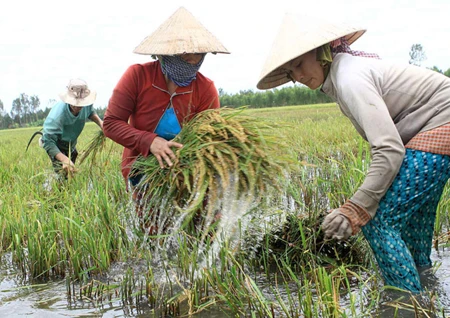 Water ponds in southern Kien Giang province's Ha Tien township have dried up as an impact of climate change (Photo: VNS/VNA)
Water ponds in southern Kien Giang province's Ha Tien township have dried up as an impact of climate change (Photo: VNS/VNA)Promoting the central role of the community in climate change adaptation continues to be a key measure to cope with the issue in a prompt, proactive and flexible manner, stated a leading official in the fields.
In the context of increasingly serious and abnormal changes in climate patterns, community-based actions will be the quickest and most effective way to respond to natural disasters, Director of the Department of the Hydrometeorology and Climate Change under the Ministry of Natural Resources and Environment Nguyen Van Tue said in an interview granted to the Vietnam New Agency.
At the same time, in order to encourage public engagement in the field, the State has an important role to play, the director said, suggesting more communication campaigns and training be provided to the community regarding how to cope with climate change and mitigate the impacts.
He urged the State to create a suitable legal framework to facilitate community involvement in the field.
The official also stressed that as climate change is a global issue, Vietnam is actively joining in international efforts to address the threat.
According to Tue, the country is actively engaging in negotiations to build a global deal on climate change which could be adopted at the 21 st United Nations Climate Change Conference (COP21) of Members to the UN Framework Convention on Climate Change (UNFCCC).
Within the bilateral cooperation framework, Vietnam has actively collaborated with Japan to implement the Joint Crediting Mechanism (JCM), worked with other countries and the World Bank to build the Partnership for Market Readiness (PMR), and carried out projects on sustainable forest protection and management and emissions reductions from deforestation and forest degradation (REDD+) with Norway.
Vietnam has also partnered with international organisations from Germany, Denmark and Japan as well as the UN Development Programme (UNDP) to carry out activities to mitigate greenhouse gas emissions in line with the conditions of each nation.
Six international donors and development partners have worked along with 10 Vietnamese ministries and sectors under the Support Programme to Respond to Climate Change (SP-RCC), since 2009, to build policies to deal with environmental changes.
More than 200 related policies have been issued, which are particularly useful for Vietnam to implement the national strategy on climate change, mitigate greenhouse gas emissions and promote green growth.
The Director cited statistics which showed that over the past three decades, natural disasters have left nearly 500 people dead or missing and thousands injured each year, while economic losses amount to 1.5 percent of total annual gross domestic product (GDP).
Vietnam is said to be among the countries hardest hit by climate change, particularly rising sea levels. According to climate change scenarios, if the sea levels rise by one meter at the end of the 21 st century, then about 39 percent of the Mekong Delta, 11 percent of the Red River Delta, and 3 percent of other coastal provinces will be submerged.
Vietnam’s largest economic hub – Ho Chi Minh City will see one fifth of its acreage covered by water in the scenario, and total economic losses will be around 10 percent of the national GDP. Close to 10-12 percent of the Vietnamese population will be directly impacted by climate change.-VNA























